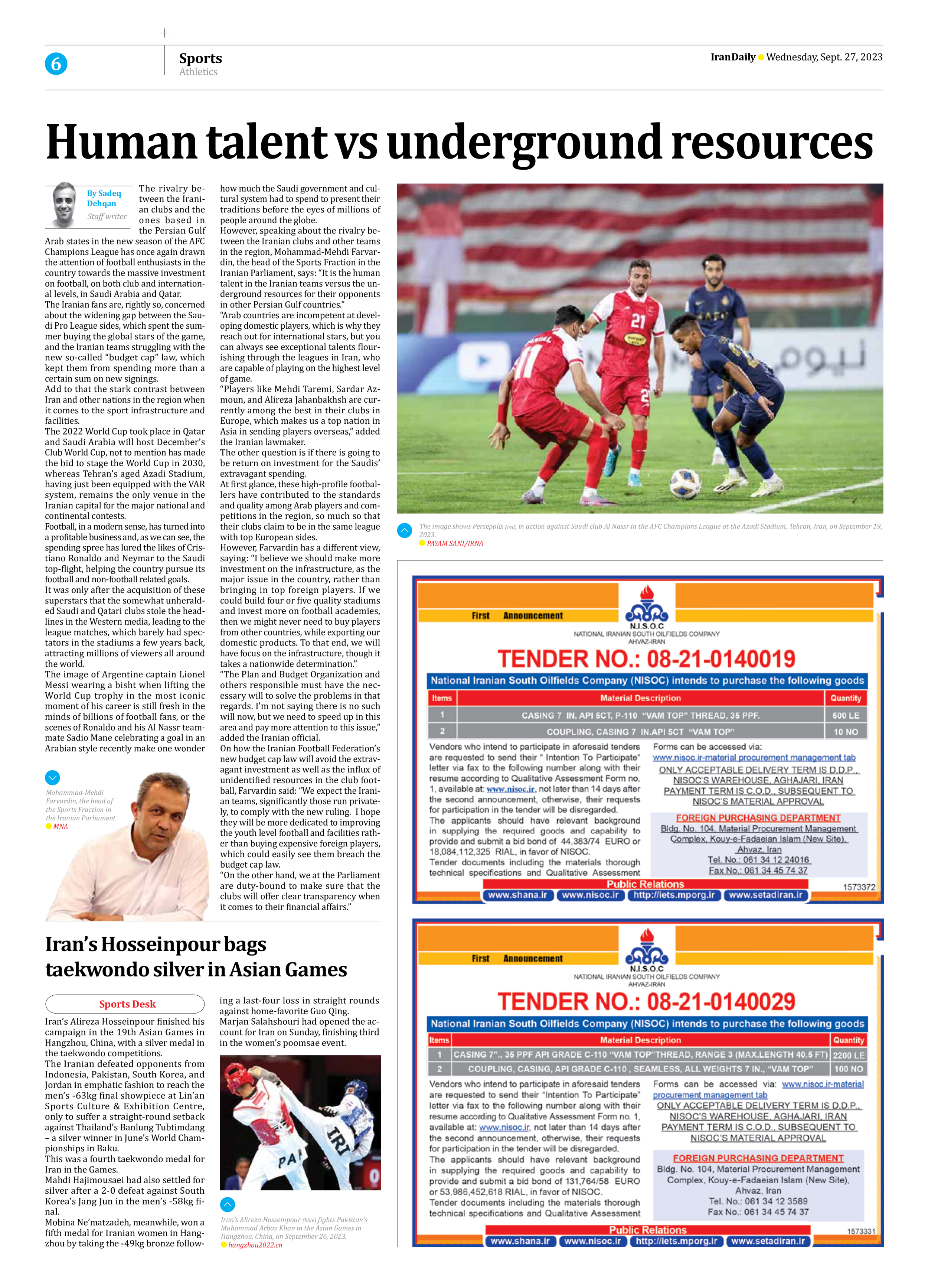
Human talent vs underground resources
By Sadeq Dehqan
Staff writer
The rivalry between the Iranian clubs and the ones based in the Persian Gulf Arab states in the new season of the AFC Champions League has once again drawn the attention of football enthusiasts in the country towards the massive investment on football, on both club and international levels, in Saudi Arabia and Qatar.
The Iranian fans are, rightly so, concerned about the widening gap between the Saudi Pro League sides, which spent the summer buying the global stars of the game, and the Iranian teams struggling with the new so-called “budget cap” law, which kept them from spending more than a certain sum on new signings.
Add to that the stark contrast between Iran and other nations in the region when it comes to the sport infrastructure and facilities.
The 2022 World Cup took place in Qatar and Saudi Arabia will host December’s Club World Cup, not to mention has made the bid to stage the World Cup in 2030, whereas Tehran’s aged Azadi Stadium, having just been equipped with the VAR system, remains the only venue in the Iranian capital for the major national and continental contests.
Football, in a modern sense, has turned into a profitable business and, as we can see, the spending spree has lured the likes of Cristiano Ronaldo and Neymar to the Saudi top-flight, helping the country pursue its football and non-football related goals.
It was only after the acquisition of these superstars that the somewhat unheralded Saudi and Qatari clubs stole the headlines in the Western media, leading to the league matches, which barely had spectators in the stadiums a few years back, attracting millions of viewers all around the world.
The image of Argentine captain Lionel Messi wearing a bisht when lifting the World Cup trophy in the most iconic moment of his career is still fresh in the minds of billions of football fans, or the scenes of Ronaldo and his Al Nassr teammate Sadio Mane celebrating a goal in an Arabian style recently make one wonder how much the Saudi government and cultural system had to spend to present their traditions before the eyes of millions of people around the globe.
However, speaking about the rivalry between the Iranian clubs and other teams in the region, Mohammad-Mehdi Farvardin, the head of the Sports Fraction in the Iranian Parliament, says: “It is the human talent in the Iranian teams versus the underground resources for their opponents in other Persian Gulf countries.”
“Arab countries are incompetent at developing domestic players, which is why they reach out for international stars, but you can always see exceptional talents flourishing through the leagues in Iran, who are capable of playing on the highest level of game.
“Players like Mehdi Taremi, Sardar Azmoun, and Alireza Jahanbakhsh are currently among the best in their clubs in Europe, which makes us a top nation in Asia in sending players overseas,” added the Iranian lawmaker.
The other question is if there is going to be return on investment for the Saudis’ extravagant spending.
At first glance, these high-profile footballers have contributed to the standards and quality among Arab players and competitions in the region, so much so that their clubs claim to be in the same league with top European sides.
However, Farvardin has a different view, saying: “I believe we should make more investment on the infrastructure, as the major issue in the country, rather than bringing in top foreign players. If we could build four or five quality stadiums and invest more on football academies, then we might never need to buy players from other countries, while exporting our domestic products. To that end, we will have focus on the infrastructure, though it takes a nationwide determination.”
“The Plan and Budget Organization and others responsible must have the necessary will to solve the problems in that regards. I’m not saying there is no such will now, but we need to speed up in this area and pay more attention to this issue,” added the Iranian official.
On how the Iranian Football Federation’s new budget cap law will avoid the extravagant investment as well as the influx of unidentified resources in the club football, Farvardin said: “We expect the Iranian teams, significantly those run privately, to comply with the new ruling. I hope they will be more dedicated to improving the youth level football and facilities rather than buying expensive foreign players, which could easily see them breach the budget cap law.
“On the other hand, we at the Parliament are duty-bound to make sure that the clubs will offer clear transparency when it comes to their financial affairs.”







